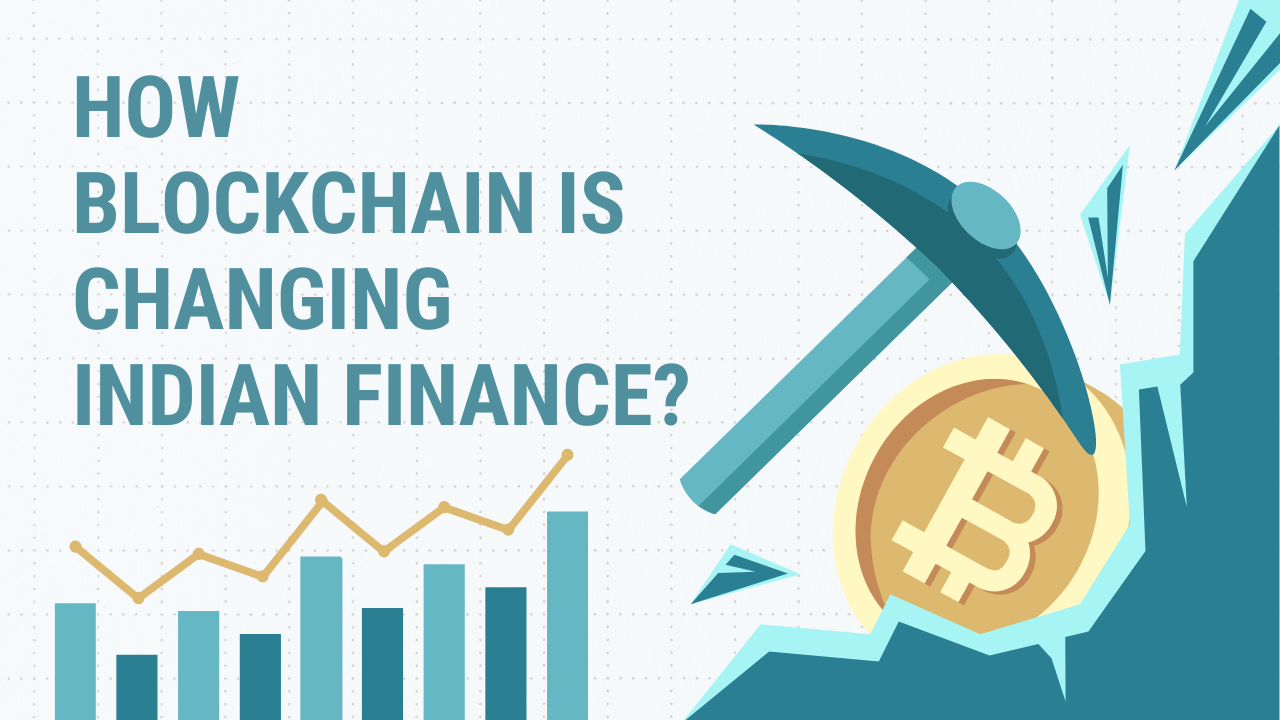India is leading the way in embracing blockchain technology, which is revolutionizing the global finance industry. How Blockchain is Changing Indian Finance? All throughout the Indian financial system, people are starting to see the light about blockchain technology and how it can improve efficiency, transparency, and security. In this article, we will examine the revolutionary effects of blockchain technology on the Indian financial industry, including its uses, pros and cons, and what the future holds for this sector.
A Beacon for Indian Finance
A distributed ledger that is safe, transparent, and unchangeable is what blockchain technology provides. This technology is the backbone of Bitcoin and other cryptocurrencies, but its applications go well beyond that. More and more, Indian banks are looking into blockchain technology for its possible use in improving the efficiency of financial services, decreasing fraud, and streamlining operations.
Transforming the World of Trade Finance

Blockchain for Secure and Efficient Transactions
Trade finance is experiencing a technological revolution as a result of blockchain technology’s adoption. Blockchain technology drastically cuts down on the time and money needed for trade finance operations by allowing for the real-time verification and updating of records among all parties involved.
Reducing Fraud with Immutable Records
When it comes to trade finance, one of the most notable advantages of blockchain is its capacity to reduce fraud. A transaction can only be recorded once in this technology’s immutable ledger. With this addition, trade finance documents are considerably more secure, making fraud considerably more difficult to pull off.
Streamlining Paperwork and Enhancing Speed
Blockchain technology solves a big problem in trade finance, which is the long processing times and mountains of paperwork. Transactions that used to take days can now be finished in hours thanks to the digitization and automation of documents on a blockchain platform.
Letters of Credit on Blockchain
An interesting project in India’s banking industry is the use of blockchain technology to issue letters of credit. This initiative, spearheaded by the Indian Banks’ Blockchain Infrastructure Company (IBBIC), represents a giant leap forward in the evolution of trade finance and the improvement of transaction security and efficiency.
Boosting Transparency and Trust

Financial Transparency
When it comes to establishing confidence among financial sector players, blockchain’s transparent ledger is indispensable. Increased openness and responsibility in monetary operations are outcomes of using the blockchain, since all participants can see every transaction.
Improving Regulatory Compliance
Compliance with regulations is also made easier by blockchain’s built-in transparency and traceability. By readily providing regulatory agencies with the required paperwork and transaction histories, financial institutions can guarantee compliance with financial rules and regulations.
Decentralized Finance (DeFi) Platforms in India
Empowering Financial Inclusion
Many people in India do not have access to traditional banking services, but that is changing thanks to decentralized finance platforms that are based on blockchain technology. Financial inclusion is promoted by DeFi platforms, which offer a variety of financial services directly to users by avoiding traditional banking infrastructure.
Innovations in Financial Products
In addition to facilitating easy access to financial services, DeFi platforms in India serve as incubators for new product development in this sector. These platforms are bringing innovative financial instruments to the Indian market, such as decentralized loans and insurance products, to meet the varied needs of Indian consumers.
Security in Financial Transactions
Financial transactions for Indian consumers are made much safer with the use of smart contracts and blockchain’s built-in security features in DeFi platforms. This greatly reduces the risk of fraud and cyberattacks.
Role of Regulatory Bodies
Reserve Bank of India’s Blockchain Initiatives
Blockchain technology has great promise, and the Reserve Bank of India (RBI) is doing its part to investigate its possible uses in the banking industry. A regulatory climate that encourages innovation while guaranteeing security and compliance can be achieved with the help of the RBI’s plans to build a blockchain platform for the sector.
Regulatory Landscape
Delicately navigating the regulatory landscape is also required for the financial sector’s adoption of blockchain technology. Indian regulatory agencies must find a way to encourage innovation while simultaneously safeguarding consumers and ensuring financial stability. Blockchain technology is constantly changing, so regulations need to be flexible enough to accommodate these changes.
Adoption of Blockchain by Indian Banks
Blockchain technology has the potential to transform the Indian banking industry by increasing efficiency, security, and customer trust. The industry is currently investigating and implementing this technology.
Indian Banks’ Blockchain Infrastructure Company (IBBIC)
The joint endeavor of Indian banks to use blockchain technology has reached a major milestone with the establishment of IBBIC. The fifteen member banks that make up this consortium are demonstrating the dedication to innovation in the banking sector by working together to use blockchain technology to improve trade finance, simplify operations, and decrease fraud.
Improving Operational Efficiency
Indian banks have a once-in-a-lifetime chance to boost operational efficiency with blockchain technology. Banks can boost service quality and customer happiness by automating and securing financial processes, which drastically decrease transaction times, operational costs, and the likelihood of human error.
Reducing Fraud and Enhancing Security
Indian banks have a potent weapon in the fight against fraud thanks to the immutable nature of blockchain. The general safety of the financial system is improved by using blockchain technology, which records transactions securely on an immutable ledger, thereby avoiding fraudulent transactions and illegal access.
Streamlining KYC Processes
Banks’ Know Your Customer (KYC) procedures are undergoing a sea change due to blockchain technology. The implementation of a shared and secure KYC database allows banks to streamline operations, cut costs associated with compliance, and expedite the onboarding process for new customers without compromising data security or privacy.
Blockchain Revolution in Indian Financial Sector
In India’s financial sector, blockchain technology is causing a complete shift, opening up new possibilities for growth and innovation beyond merely improving operations.
Enabling Smart Contracts
A “smart contract” is an agreement whose terms are encoded in computer code and which can be executed automatically. By eliminating middlemen and automating the enforcement of agreements, such as insurance payouts and loan disbursals, these contracts can help the Indian financial sector reduce the likelihood of disputes and fraud.
Facilitating Cross-Border Payments
Indian banks may soon find that blockchain technology streamlines international money transfers. Reduced transaction costs, decreased settlement times, and increased transparency in international payments are all possible thanks to blockchain technology, which allows direct transactions without intermediaries.
Empowering Microfinance and Small Enterprises
By creating safe, transparent, and efficient platforms for small businesses and microfinance institutions to access credit and other financial services, blockchain technology has the potential to drive economic growth and financial inclusion.
Innovations in Blockchain for Indian Finance
There has been a recent uptick in blockchain-based innovations within India’s financial ecosystem, with the goal of solving particular problems and capitalizing on untapped growth and efficiency potential.
Blockchain Startups Ecosystem in India
Innovative blockchain solutions developed specifically for the financial sector are being spearheaded by India’s thriving startup ecosystem. As part of their contributions to India’s ever-changing financial technology landscape, these startups are developing a wide variety of applications, such as payment systems and asset management platforms.
Digital Identity Verification
With its immutable and secure method of managing digital identities, blockchain technology is transforming digital identity verification. Because of the critical nature of identity verification to compliance and security in the financial sector, this innovation is of particular relevance in this area.
Tokenization of Assets
Indian investors and asset managers now have more options than ever before thanks to tokenization, the process of turning an asset’s rights into a digital token on a blockchain. Tokenizing assets like real estate, artwork, or even stock in a company is one way blockchain is increasing their liquidity and accessibility.
FAQs
What is blockchain technology?
To record transactions securely across numerous computers, blockchain uses a decentralized, distributed ledger system.
How are Indian banks adopting blockchain?
Joining forces with organizations like IBBIC, Indian banks are investigating blockchain’s potential for use in trade financing, know-your-customer procedures, and the fight against fraud.
What are the benefits of blockchain in finance?
Financial product and service innovation, operational efficiency, transparency, and enhanced security are all possible with blockchain technology.
Can blockchain reduce fraud in banking?
Unauthorized transactions and fraud can be lessened with the help of blockchain technology’s immutable ledger.
What future prospects does blockchain hold for Indian finance?
An improved and safer financial ecosystem in India is within reach, thanks to blockchain technology’s capacity to revolutionize payment systems, make smart contracts possible, and ease international transactions.
Also Read: Blockchain Innovation Indian Market
Conclusion
In addition to revolutionizing the Indian financial sector, blockchain technology is paving the way for future monetary transactions that are more transparent, secure, and expedited. India is well-positioned to fully utilize blockchain technology, thanks to initiatives like the IBBIC and the involvement of regulatory bodies like the RBI .How Blockchain is Changing Indian Finance? To fully experience the revolutionary effects of blockchain technology on the Indian financial sector, it is essential to strike a balance between innovation, security, and regulatory compliance. With the technology’s ongoing development, its financial applications are only going to grow, and soon blockchain will be a staple of India’s financial services.

Timothy Jensen is an expert writer who specializes in the world of cryptocurrencies, including blockchain technology and Bitcoin. He has a passion for explaining complex topics in an easy-to-understand way. Timothy’s work aims to demystify the digital currency landscape for his readers.

